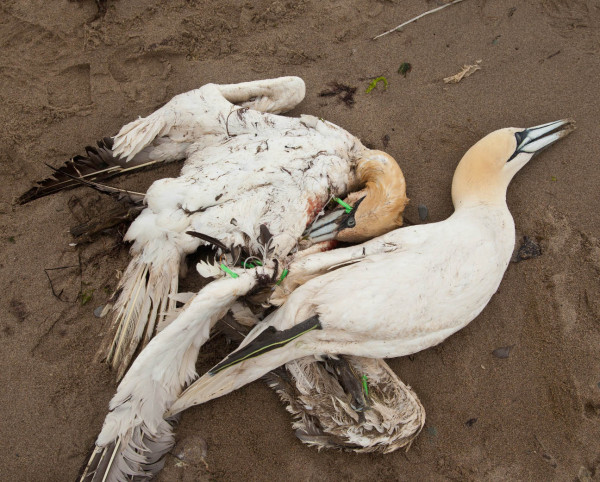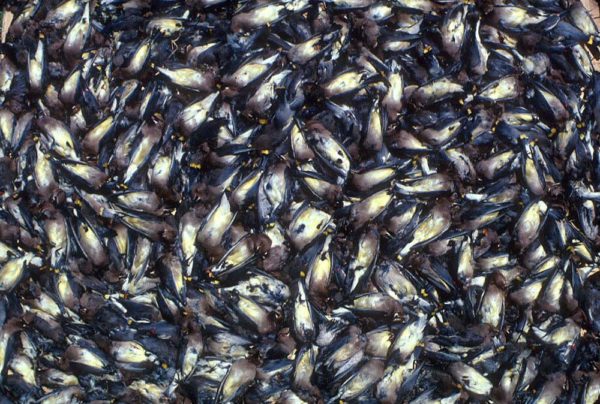Using the sword of Damocles to decapitate The Migratory Bird Treaty Act

Grace Transmitter Stops Sending Signal
November 7, 2017
Bald Eagle Purple DC Jan 1, 2018
January 5, 2018By Bryan Watts | bdwatt@wm.edu | (757) 221-2247
January 3, 2018
On 22 December as the nation was gearing down for the festive Christmas holiday, the Department of Interior quietly released a memo redefining the terms of how the Migratory Bird Treaty Act (MBTA) will be enforced. The document, written by the agency’s new Principal Deputy Solicitor, Daniel Jorjani, will have far-reaching impacts on bird conservation throughout the United States and represents the culmination of a decades-long fight by lobbyists to undermine the Act. The action effectively removes (by interpretation) a key prohibition and constrains the U.S. Fish and Wildlife Service (USFWS) from pursuing the original intent of the Act.

Two northern gannets tangled in a long-line fishing rig. Fishing bycatch is a major source of mortality for seabirds along the coast of the United States and throughout the world. Under the new memo, there will be no liability for killing gannets or many other seabirds with fishing gear. Photo by Bryan Watts.
The MBTA (and its predecessors) has been the legal cornerstone of bird protection in the United States for more than 100 years. The Act represents the legal first-line-of-defense for more than 1,000 species and its mere existence and long history is a reflection of how our society has valued bird populations. By drawing a line in the sand defining acceptable conduct, the Act has educated generations of conservation-minded citizens and set a standard for corporate behavior. The memo released on 22 December shifts the line and by doing so represents a sea-change in the value that our society places on bird populations.
Wildlife laws are often vague and include terms that are open to interpretation. From a practical standpoint, implementation of these laws requires that regulatory agencies formulate working definitions that may be used to clarify prohibited activities to telegraph intended prosecutorial boundaries. Changing the definitions effectively changes which behaviors will be prosecuted under the law. The MBTA clearly states a prohibition on “killing” protected birds. Over the past several decades, the U.S. Fish and Wildlife Service has recognized killing to include “intended take” (e.g. shooting and capture) and “incidental take” (unintended killing) as prohibited behaviors under the Act.
In practice, the U.S. Fish and Wildlife Service has long recognized two forms of “incidental take,” including accidental killing where the mortality could not have been reasonably anticipated or avoided and unintended killings where the mortality could have been reasonably anticipated and prevented. No one wants to prosecute every homeowner who has had a bird fly into a window or every driver who has hit a bird flying across the road, and no prosecutions of this type have been brought forth. However, situations where a party knowingly places large numbers of birds at risk of being killed should be avoided (see example below following the main story), and it is in the public’s interest to have legal deterrents to these activities. In the past, the USFWS has used the MBTA to work toward resolving these types of incidental takes to protect bird populations. The 22 December memorandum eliminates the legal avenue to find a reasonable solution.

A sample of more than 40 pounds (>1,000) of cedar waxwings killed along less than 100 meters of Interstate 64 in Virginia. The birds were attracted to their deaths by fruiting shrubs planted in the median. The situation was resolved when the Virginia Department of Transportation agreed under threat of MBTA to remove the shrubs. Under the new interpretation of MBTA, the U.S. Fish and Wildlife Service would be impotent to request such removal. Photo by Bryan Watts.
The MBTA was passed during a time when very large numbers of birds were being taken for commercial enterprises for collections or to prevent perceived impacts to game or farm animals. However, the intent of the MBTA was not merely to restrict recreational collecting and other activities, but instead to preserve bird populations in perpetuity. In his long and winding memorandum, Solicitor Jorjani abandons the original intent and redefines “killing” as only including acts with the “intent” to kill birds. Birds that are killed during activities where the primary intent is other than to specifically kill birds are no longer subject to the Act.
In making this change, Jorjani invoked the words of Justice Thurgood Marshall, “the value of the sword of Damocles is that it hangs – not that it drops.” Marshall used the anecdote to refer to the chilling effects that power or the overbroad interpretation of laws may have on the liberties of those subject to the law. Without question, balance is the key to effective implementation of wildlife laws. However, bird populations belong to the public, and reasoned measures should be taken to protect our shared heritage. In making this change, Jorjani has in effect hung the sword over the heads of many bird populations and left them without a legal advocate.
I have worked in the bird conservation business long enough to have seen many, many examples of how the MBTA has been used reasonably and effectively to avoid unnecessary impacts to bird populations. In the majority of cases, birds could be protected with minimal impacts to business. One example from the past comes to mind.
In June of 1994, while surveying for piping plovers on the north end of Wallops Island in Virginia, I could see an unusually white wrack line in the distance as the tide ebbed out. The mystery was not resolved until I actually reached the line, examined the white objects, and realized that they were the bleached keels of red-throated loons. The line of keels stretched more than a mile to the north and represented 10,000+ loons. Sometime during the winter there had been a significant kill and the keels piled up by the surf were what remained. Later investigation revealed that the loons were bycatch from the nearshore gill netters, the same group that had been responsible for scores of sea turtles and bottlenose dolphins that had been washing up on the islands for years. The netters were not charged, but with full consideration of the implications of MBTA, they were convinced to move farther off shore beyond the normal foraging area of the loons.
Under the MBTA that Jorjani envisions, the loons killed by gill netters would not be subject to any legal violation. After all, the gill netters were there to catch fish, not birds. Yet since they had to remove the loons from nets, they had to be aware of the hazard they were creating for a federally protected species. But here killing the loons was a mere nuisance. Removing any legal liability from parties who recklessly kill large numbers of protected birds, despite being able to avoid doing so, is a clear perversion of the original intent of MBTA and serves no one but those in special interest groups.
